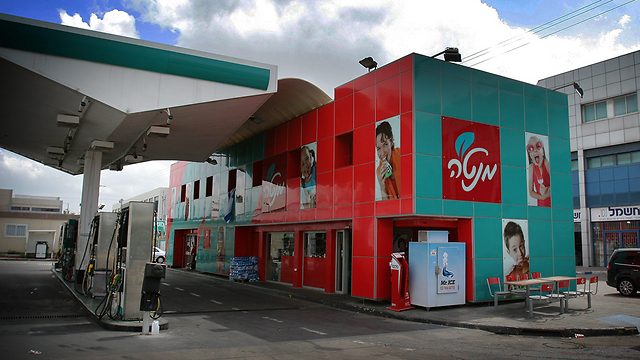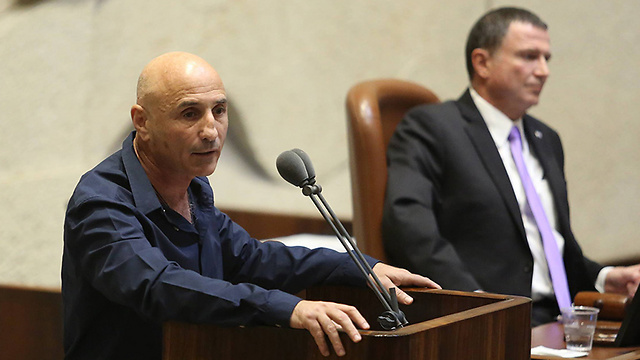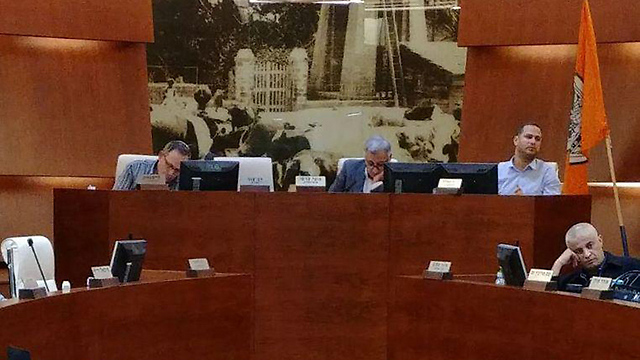
Gas station convenience stores
Photo: Avi Moalem
While the Supermarkets Bill
is awaiting its second and third readings, the powers it confers upon Interior Minister Aryeh Deri
may be more considerable than initially apparent and include the authority to order gas station convenience stores to shut down on Shabbat, a legal opinion obtained by Ynet said.
 As part of a thorough review of the bill and its potential implications conducted by MK Ofer Shelah (Yesh Atid), the Knesset's Internal Affairs and Environment Committee's legal adviser Tomer Rozner said, "The bill shows that a local authority's bylaw regulating the opening and closing of convenience stores on days of rest will need to be approved by the interior minister and will be included in the bill's expected purview."
As part of a thorough review of the bill and its potential implications conducted by MK Ofer Shelah (Yesh Atid), the Knesset's Internal Affairs and Environment Committee's legal adviser Tomer Rozner said, "The bill shows that a local authority's bylaw regulating the opening and closing of convenience stores on days of rest will need to be approved by the interior minister and will be included in the bill's expected purview."


Whether the bill will also allow the minister to order the gas stations themselves closed remained to be seen.
Minister Deri, who sponsored the bill following the High Court's ruling allowing Tel Aviv supermarkets to remain open on Shabbat, announced he was interested in maintaining the status quo and disallow supermarkets to remain open in city centers on Shabbat.

Supermarket Law will also enable to order gas station convenience stores to close (Photo: Avi Moalem)
"The proposed arrangement will apply to bylaws regulating the opening and closing of all businesses within the local authority's jurisdiction, except for two types of businesses: public places of entertainment (such as cinemas, sporting events and theaters—ed) and businesses selling food and beverages for on-site consumption (restaurants, cafés and the like). Therefore, convenience stores offering different consumer goods for sale are not exempted from the bill's purview and will be included in the arrangement," Rozner explained.
The committee's legal adviser further expounded that, "An interesting question that should be clarified in legislation is the status of a business only partially included in the list of exemptions, such as a store that also houses a café or restaurant. The fate of such a business is not is not clearly indicated in the bill."
The Yesh Atid party has already announced it will object to the bill publically and politically. "As we have said in advance, the Supermarkets Bill and (Prime Minister Benjamin) Netanyahu's surrender to the Haredim will only increase tensions and divisions, and will bring about radicalization in both sides of the issue," said MK Shelah. "Netanyahu and (former Health Minister Ya'akov) Litzman have crossed red lines, and now everyone can plainly see the damage done to Israel's citizens. The end result will only be more Shabbat desecration and more radicalization."

Yesh Atid MK Shelah said the law will only lead to 'greater Shabbat desecration' (Photo: Gil Yohanan)
Shelah's fellow party member MK Mickey Levy announced he has instructed his team to prepare as many reservations to the bill as possible, leading to a prolonged filibuster of the vote on it. "Who does it perturb that people who have worked all week and want to hike on Shabbat pass for a coffee and a sandwich along the way," MK Levy wondered. "It's nothing less than political opportunism and daylight robbery."
Not all members of the coalition were behind the bill. Four of Yisrael Beytenu's MKs, for instance, were expected to vote against the bill, while Minister of Immigrant Absorption Sofa Landver was expected to miss the vote altogether, to go around the rule stating any minister voting against the government is summarily fired.
Yisrael Beytenu Chairman and Defense Minister Avigdor Lieberman wrote a message of support on social media Tuesday to local authority heads who rushed to pass bylaws enshrining the current status quo before the bill passes in the Knesset.

Rishon LeZion's city council attempted to get new bylaws on the book before the law passed (Photo: Rishon LeZion municipality)
"Activity in the public sphere on Shabbat is a matter for local government alone," Lieberman said. "Yes to tradition, yes to Jewish values, not to religious coercion."
Local authorities across the country attempted to pass legislation allowing supermarkets to remain open on Shabbat to head off the bill's passage. Rishon LeZion's city council approved an amendment to the city's law allowing businesses to remain open in industrial areas and the city's main thoroughfares. The Givatayim municipality tried to do the same, but has thus far been prevented from doing so by court order.

















